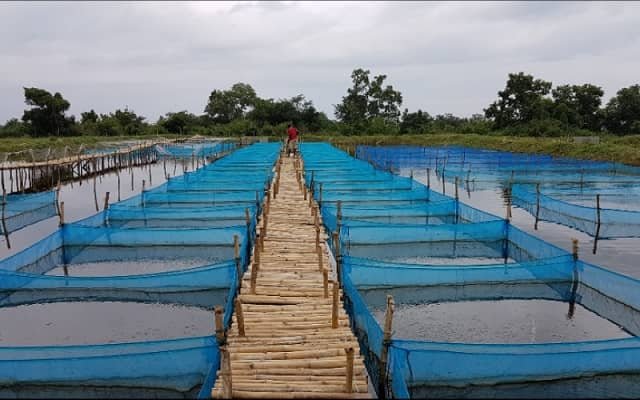The British Veterinary Association (BVA) has launched a new policy position on UK sustainable finfish aquaculture.
It calls for more research into the welfare needs of fish and the impact of aquaculture on the environment, as well as urging vets to consider roles in the sector as part of their careers.
Aquaculture is one of the UK’s key strategic food production sectors, particularly in Scotland where salmon farming provides essential jobs in remote and rural communities. However, questions have been raised as to whether it can ever truly be sustainable. The new BVA policy position on UK sustainable finfish aquaculture, which follows BVA’s 2019 position on UK sustainable animal agriculture, sets out the association’s vision for sustainable development of the finfish farming sector and the need to fully consider respect fish welfare.
Developed by a panel of experts and focusing specifically on finfish such as salmon and trout, the position discusses and makes recommendations on key issues such as the health and welfare of farmed fish, the impact of fish farming on the environment and biodiversity, and the involvement of the veterinary profession in the sector.
Aquaculture should be undertaken in a way that is environmentally, ethically, and economically sustainable. To achieve this, aquaculture systems should work towards positive animal welfare for the fish being farmed. As there are still major evidence gaps in relation to fish welfare, BVA is recommending more research be commissioned to help understand fish, their welfare needs and how these can be best met in captivity for them to have a good life. It is also vital that more research is undertaken to assess how aquaculture impacts the environment and biodiversity. This includes exploring issues such as the effect of escapes and the interaction of farmed fish with wild populations, the use of medicines and how to minimise aquaculture’s carbon footprint.
BVA is also calling for more vets to become involved in the aquaculture sector. During their education, although vets receive university training in caring for small animal and farmed species, most will graduate with little experience or understanding of how to care for fish and usually complete additional qualifications to work in aquaculture. This has resulted in a shortage of vets with the expertise to advise the sector. However, BVA believes vets should play a key and active role in aquaculture and is encouraging more visibility of related roles within the veterinary industry, particularly at universities, to encourage more students to consider working with fish as part of their career paths. Existing vets are also urged to expand their knowledge of the sector and fish welfare and consider how taking on a role in aquaculture could enhance their careers.
BVA Senior Vice President Justine Shotton said: “Aquaculture represents a significant proportion of the UK’s food production but more understanding and research is needed into fish health and welfare and the wider environmental impacts of this industry. There is scope for the veterinary profession to play a more significant part in aquaculture and we hope to encourage students and vets already in practice to consider exploring related roles during their careers. We hope this position provides some clarity on what could be done to futureproof and enhance the sector.”
Dr Simon Doherty, BVA past-president and Chair of the BVA Sustainable Aquaculture Working Group, welcomed the approval of the position: “It was a privilege for me as a former BVA Officer to see the development of this position through to completion. We had a wealth of expertise and experience within the working group, including from the Fish Veterinary Society, and were joined at our meetings by regulators, government and industry representatives and a range of allied stakeholders to create a holistic, forward-thinking position for the association and its members.
“Vets play an absolutely critical role in the sustainability of food systems and it’s great that, through the release of this position, BVA is championing the vital role the veterinary profession plays in sea-based agriculture in the same way that it has previously done with land-based agriculture.”
Stay Always Informed
Join our communities to instantly receive the most important news, reports, and analysis from the aquaculture industry.
Read the full BVA sustainable aquaculture policy position at bva.co.uk/aquaculture.
Editor at the digital magazine AquaHoy. He holds a degree in Aquaculture Biology from the National University of Santa (UNS) and a Master’s degree in Science and Innovation Management from the Polytechnic University of Valencia, with postgraduate diplomas in Business Innovation and Innovation Management. He possesses extensive experience in the aquaculture and fisheries sector, having led the Fisheries Innovation Unit of the National Program for Innovation in Fisheries and Aquaculture (PNIPA). He has served as a senior consultant in technology watch, an innovation project formulator and advisor, and a lecturer at UNS. He is a member of the Peruvian College of Biologists and was recognized by the World Aquaculture Society (WAS) in 2016 for his contribution to aquaculture.







